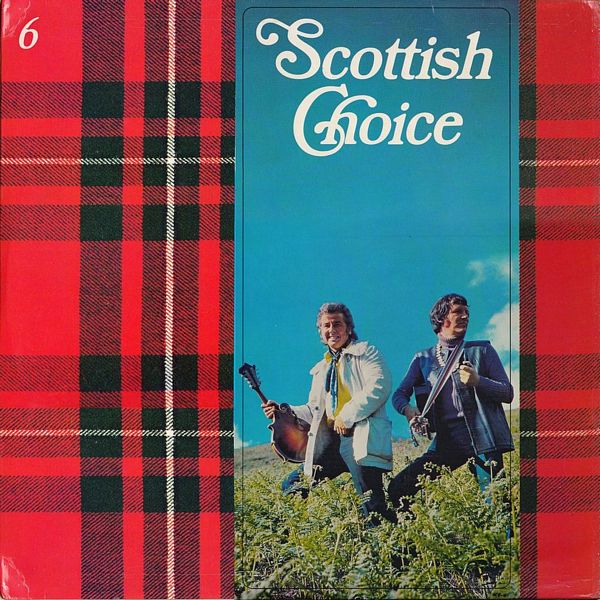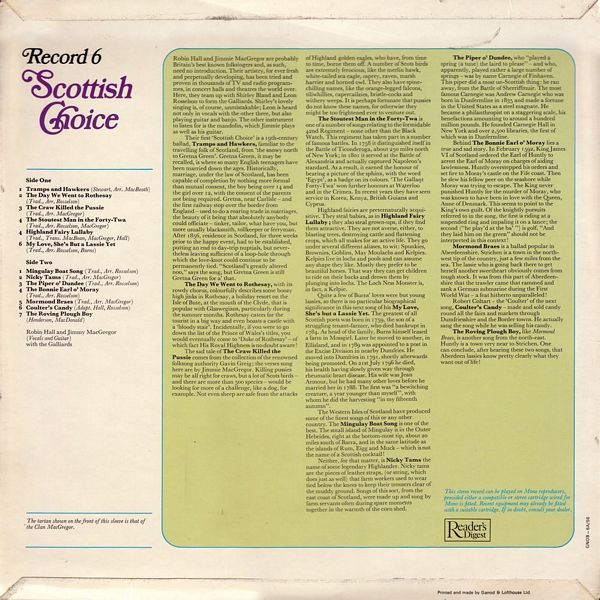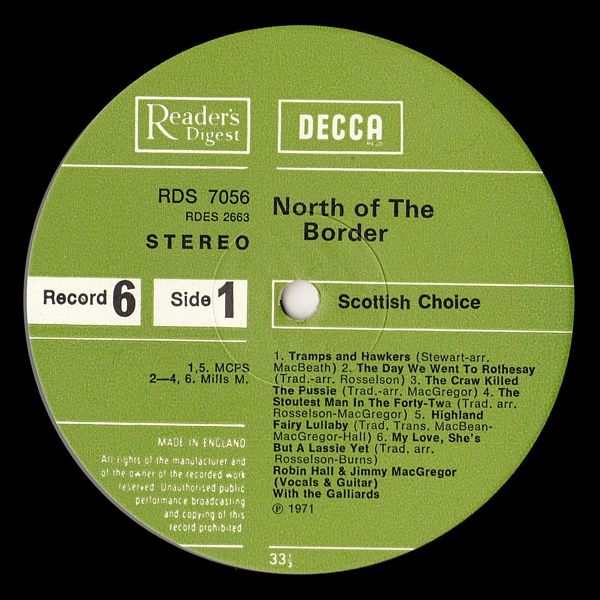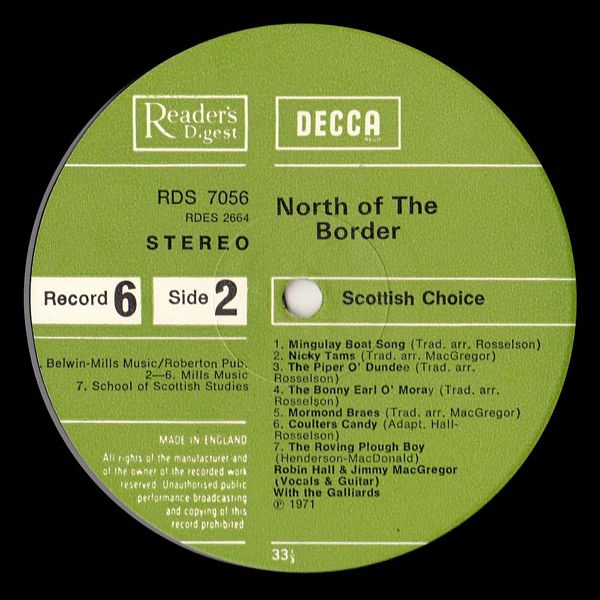

 |


 |
Sleeve Notes
Robin Hall and Jimmie MacGregor are probably Britain's best known folksingers and, as such, need no introduction. Their artistry, for ever fresh and perpetually developing, has been tried and proven in thousands of TV and radio programmes, in concert halls and theatres the world over. Here, they team up with Shirley Bland and Leon Rosselson to form the Galliards. Shirley's lovely singing is, of course, unmistakable; Leon is heard not only in vocals with the other three, but also playing guitar and banjo. The other instrument to listen for is the mandolin, which Jimmie plays as well as his guitar.
Their first 'Scottish Choice' is a 19th-century ballad, Tramps and Hawkers, familiar to the travelling folk of Scotland, from 'the snowy north to Gretna Green'. Gretna Green, it may be recalled, is where so many English teenagers have been married down the ages. Historically, marriage, under the law of Scotland, has been capable of completion by nothing more formal than mutual consent, the boy being over 14 and the girl over 12, with the consent of the parents not being required. Gretna, near Carlisle — and the first railway stop over the border from England — used to do a roaring trade in marriages, the beauty of it being that absolutely anybody could officiate — tinker, tailor, what have you, but more usually blacksmith, tollkeeper or ferryman. After 1856, residence in Scotland, for three weeks prior to the happy event, had to be established, putting an end to day-trip nuptials, but nevertheless leaving sufficient of a loop-hole through which the love-knot could continue to be permanently tied. "Scotland's greatly altered noo," says the song, but Gretna Green is still Gretna Green for a' that.
The Day We Went to Rothesay, with its rowdy chorus, colourfully describes some boozy-high jinks in Rothesay, a holiday resort on the Isle of Bute, at the mouth of the Clyde, that is popular with Glaswegians, particularly during the summer months. Rothesay caters for the tourist in a big way and even boasts a castle with a 'bloody stair'. Incidentally, if you were to go down the list of the Prince of Wales's titles, you would eventually come to 'Duke of Rothesay' — of which fact His Royal Highness is no doubt aware!
The sad tale of The Craw Killed the Pussie comes from the collection of the renowned folksong authority Gavin Greig; the verses sung here are by Jimmie MacGregor. Killing pussies may be all right for craws, but a lot of Scots birds — and there are more than 500 species — would be looking for more of a challenge, like a dog, for example. Not even sheep are safe from the attacksof Highland golden eagles, who have, from time to time, borne them off. A number of Scots birds are extremely ferocious, like the merlin hawk, white-tailed sea eagle, osprey, raven, marsh harrier and homed owl. They also have spine-chilling names, like the orange-legged falcons, tiliwhillies, capercailzies, bristle-cocks and withery weeps. It is perhaps fortunate that pussies do not know these names, for otherwise they might be too frightened ever to venture out.
The Stoutest Man in the Forty-Twa is one of a number of songs relating to the formidable 42nd Regiment — none other than the Black Watch. This regiment has taken part in a number of famous battles. In 1758 it distinguished itself in the Battle of Ticonderoga, about 250 miles north of New York; in 1801 it served at the Battle of Alexandria and actually captured Napoleon's standard. As a result, it earned the honour of bearing a picture of the sphinx, with the word 'Egypt', as a badge on its colours. 'The Gallant Forty-Twa' won further honours at Waterloo and in the Crimea. In recent years they have seen service in Korea, Kenya, British Guiana and Cyprus.
Highland fairies are preternaturally acquisitive. They steal babies, as in Highland Fairy Lullaby; they also steal grown-ups, if they find them attractive. They are not averse, either, to blasting trees, destroying cattle and flattening crops, which all makes for an active life. They go under several different aliases, to wit: Spunkies, Brownies, Goblins, May Moulachs and Kelpies. Kelpies live in lochs and pools and can assume any shape they like. Mostly they prefer to be beautiful horses. That way they can get children to ride on their backs and drown them by plunging into lochs. The Loch Ness Monster is, in fact, a Kelpie.
Quite a few of Burns' loves were but young lassies, so there is no particular biographical significance in this next song of his My Love, She's but a Lassie Yet. The greatest of all Scottish poets was born in 1759, the son of a struggling tenant-farmer, who died bankrupt in 1784. As head of the family, Burns himself leased a farm in Mossgiel. Later he moved to another, in Ellisland, and in 1789 was appointed to a post in the Excise Division in nearby Dumfries. He moved into Dumfries in 1791, shortly afterwards being promoted. On 21st July 1796 he died, his health having slowly given way through rheumatic heart disease. His wife was Jean Armour, but he had many other loves before he married her in 1788. The first was "a bewitching creature, a year younger than myself", with whom he did the harvesting "in my fifteenth autumn".
The Western Isles of Scotland have produced some of the finest songs of this or any other country. The Mingulay Boat Song is one of the best. The small island of Mingulay is in the Outer Hebrides, right at the bottom-most tip, about 20 miles south of Barra, and in the same latitude as the islands of Rum, Eigg and Muck — which is not the name of a Scottish cocktail!
Neither, for that matter, is Nicky Tams the name of some legendary Highlander. Nicky tarns are the pieces of leather straps, (or string, which does just as well) that farm workers used to wear tied below the knees to keep their trousers clear of the muddy ground. Songs of this sort, from the east coast of Scotland, were made up and sung by farm servants often during spare moments together in the warmth of the corn shed.
The Piper o' Dundee, who "played a spring (a tune) the laird to please" — and who, apparently, played rather a large number of springs — was by name Carnegie of Finhaven.
This piper did a most un-Scottish thing: he ran away, from the Battle of Sherriffmuir. The most famous Carnegie was Andrew Carnegie who was born in Dunfermline in 1835 and made a fortune in the United States as a steel magnate. He became a philanthropist on a staggering scale, his benefactions amounting to around a hundred million pounds. He founded Carnegie Hall in New York and over 2,500 libraries, the first of which was in Dunfermline.
Behind The Bonnie Earl o' Moray lies a true and sad story. In February 1592, King James VI of Scotland ordered the Earl of Huntly to arrest the Earl of Moray on charges of aiding lawlessness. Huntly overstepped his orders and set fire to Moray's castle on the Fife coast. Then he slew his fellow peer on the seashore while Moray was trying to escape. The King never punished Huntly for the murder of Moray, who was known to have been in love with the Queen, Anne of Denmark. This seems to point to the King's own guilt. Of the knightly pursuits referred to in the song, the first is riding at a suspended ring and impaling it on a lance; the second ("he play'd at the ba' ") is golf. "And they laid him on the green" should not be interpreted in this context!
Mormond Braes is a ballad popular in Aberdeenshire. Strichen is a town in the northwest tip of the country, just a few miles from the sea. The lassie who is going back there to get herself another sweetheart obviously comes from tough stock. It was from this part of Aberdeenshire that the trawler came that rammed and sank a German submarine during the First World War — a feat hitherto unparalleled!
Robert Coltart — the 'Coulter' of the next song, Coulter's Candy — made and sold candy round all the fairs and markets through Dumfriesshire and the Border towns. He actually sang the song while he was selling his candy.
The Roving Plough Boy, like Mormond Braes, is another song from the north-east.
Huntly is a town very near to Strichen. One can conclude, after hearing these two songs, that Aberdeen lassies know pretty clearly what they want out of life!